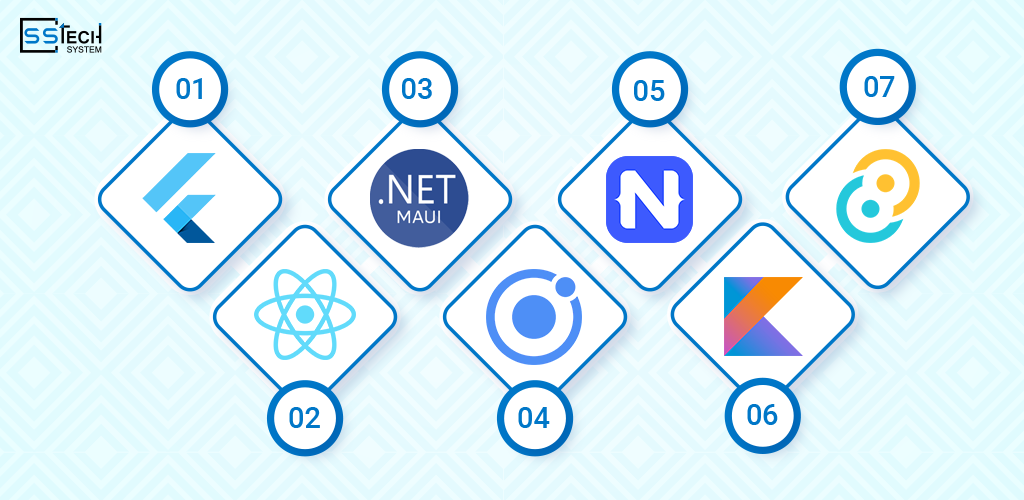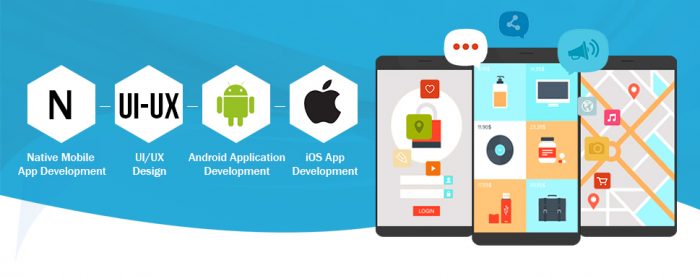
Business success is now largely based on digital presence, and mobile app development has become a vital aspect of this. As such, there is a spiked demand of mobile app development that is scalable, efficient, and cost-effective. Businesses are no longer interested in developing Android and iOS applications separately. On the contrary, they are looking forward to a cross-platform app framework – a unified tool to build strong apps using one code. This step-by-step tutorial covers all that you want to know about cross-platform development.
What Is a Cross-Platform App Framework?
With a cross-platform app framework, developers can create a single base of code that runs on multiple operating systems, often including Android, iOS, and even Windows or the web. Rather than spending time, resources, and money to develop two teams that will develop applications on two platforms independently, companies can save time, cost, and energy by investing in a cross-platform mobile SDK or framework.
These frameworks are not some only cost-reducing systems but are also quick in deployment, arrangement of easy maintenance, and recurrence in user experience. Companies that undertake the use of cross-platform development services will now be able to compete in an ever-changing market rapidly and also provide feature rich applications on all devices.
Why Choose Cross-Platform Development?
The choice between cross-platform vs native development depends on factors like project complexity, performance needs, and budget. However, the benefits of cross-platform development are undeniable for most business use cases:
- Reduced Time-to-Market: One codebase means your team can release on both platforms simultaneously.
- Lower Development Costs: A single team can handle the project instead of separate Android and iOS developers.
- Scalability: As your user base grows, you can scale with ease using cross-platform app development services.
Especially for mobile app development for businesses, choosing the right cross-platform app development company can significantly improve operational efficiency and customer reach.
Top Cross-Platform Frameworks in 2026
Let’s take a deeper look at the most robust and widely-used cross-platform frameworks in today’s mobile development landscape.
1. Flutter App Development
Flutter is a framework Google has developed and has become popular worldwide due to the ability of creating attractive, native, built-with-one-code-base applications. It is based on Dart language and has a large catalog of widgets to make expressive UIs.
Why businesses love Flutter:
- Hot Reload: Allows developers to instantly see changes without restarting the app.
- Native Performance: Compiles to native ARM code.
- Beautiful UI: Leverages its widget system for pixel-perfect design.
Flutter is perfect to use with startups, MVP, and companies that require a rich UI/UX. The development of Flutter apps has evolved quite fast and can be used beyond mobile to also develop web and desktop apps.
2. React Native App Development
Programmed by Meta (formerly Facebook), React Native is among the most popular frameworks in cross-platform app development. It enables developers to develop apps with JavaScript and React to work and feel as a native application.
What makes React Native a great choice:
- Large Community: Thousands of libraries, tutorials, and community support.
- Reusable Components: Shareable logic and design between platforms.
- Rich Ecosystem: Easily integrates with third-party plugins and native code.
React Native is perfectly suitable to scenario when the apps should be quickly updated, with a high level of performance and community solutions.
3. .NET MAUI App Development Services
.NET MAUI (Multi-platform App UI) is Microsoft’s official replacement for Xamarin and supports building apps across Android, iOS, macOS, and Windows using C# and .NET.
Why enterprises prefer .NET MAUI:
- Single Project Structure: Easier to manage multi-platform development.
- Full Native API Access: Integrate any device-specific features effortlessly.
- Enterprise Integration: Connects well with Microsoft Azure, SQL Server, and other enterprise systems.
.NET MAUI is a great option for businesses deeply invested in Microsoft technologies. With .NET MAUI app development services, organizations can build secure, high-performance apps with long-term support.
4. Ionic Framework
The Ionic framework focuses on hybrid app development and is known for its simplicity and speed. Built with HTML, CSS, and JavaScript, it relies on WebView to render mobile applications.
Why Ionic works for many businesses:
- Rapid Prototyping: Build MVPs fast.
- Wide Range of Plugins: Cordova and Capacitor plugins extend native capabilities.
- Cross-Platform UI Components: Pre-built components save design time.
However, since it uses WebView, performance can be a concern for graphics-heavy apps. Security must be handled carefully. For web to mobile app conversion frameworks, Ionic is one of the top picks.
5. NativeScript Development
NativeScript is an open-source framework that enables truly native app development using JavaScript, Angular, or Vue.js. It gives developers full access to native APIs without requiring native programming languages like Java or Swift.
Why choose NativeScript?
- No WebView: Unlike Ionic, NativeScript renders UIs using native components.
- Cross-Platform Plugins: Access features like GPS, camera, and file storage.
- Supports Modern JS: Use Angular or Vue for logic and structure.
This framework is excellent for teams that want native performance with web technologies.
6. Kotlin Multiplatform vs Flutter
Kotlin Multiplatform allows developers to share common code across platforms while writing platform-specific UI separately. It’s growing as a competitor to Flutter for business apps.
Comparison insights:
- Kotlin Multiplatform: Ideal for logic sharing in large-scale projects.
- Flutter: Superior UI and faster prototyping.
In the Kotlin Multiplatform vs Flutter debate, Flutter wins for UI-heavy apps, while Kotlin shines for backend-heavy or enterprise-grade logic-sharing across platforms.
7. Tauri Software Framework
Tauri is a relatively new framework that allows you to build desktop applications with any frontend (like React or Svelte) and backend using Rust. It emphasizes minimal size and high security.
Features to consider:
- Lightweight: Smaller bundle size than Electron or other hybrid frameworks.
- Secure: Rust-powered backend reduces vulnerabilities.
- Cross-Platform Desktop Apps: Supports macOS, Linux, and Windows.
While not a traditional mobile SDK, Tauri software framework is great for progressive and hybrid setups that aim for desktop and mobile compatibility using a single code base.
Choosing the Right Mobile App Development Framework
Selecting a mobile app development framework goes beyond popularity. You should evaluate:
- App Complexity: More complex UIs may need Flutter; data-heavy apps can benefit from Kotlin Multiplatform or .NET MAUI.
- Performance Needs: Flutter and React Native deliver near-native performance.
- Long-Term Maintenance: React Native has a mature ecosystem; MAUI benefits from Microsoft’s stability.
SSTech System: Flutter and React Native Experts
Choosing a framework is easier when you partner with professionals. SSTech System Flutter and React Native Experts help businesses:
- Analyze business goals
- Select the right cross-platform mobile app solutions
- Develop secure, scalable, and user-friendly apps
- Provide full-cycle cross-platform development services
- Maintain and upgrade post-launch apps
Through SSTech System app framework consulting, you can ensure you’re on the most suitable path for sustainable app development.
Mobile App Development for Businesses
Today’s competitive markets demand that mobile app development for businesses be flexible, cost-efficient, and user-centered.
What modern businesses need from apps:
- Real-time updates and data sync
- Integration with cloud and legacy systems
- Custom dashboards and analytics
With custom cross-platform app development, your business can adapt faster to customer needs and market changes.
Cross-Platform vs Native Development
Let’s examine this critical choice.
| Factor | Cross-Platform | Native |
|---|---|---|
| Codebase | Shared across platforms | Separate per platform |
| Performance | Near-native | Full native |
| UI/UX | Slightly limited customization | Full design freedom |
| Development Speed | Faster | Slower |
| Cost | Lower | Higher |
| Ideal Use Case | Business apps, MVPs | Business apps, MVPs |
A third alternative is hybrid app development, which merges features from both native and web apps while depending heavily on WebViews.
Hybrid App Development and Frameworks
Hybrid app development frameworks such as Ionic, Cordova, and Framework7 allow for quick deployment using web languages like HTML and JavaScript.
Advantages:
- Reduced development time
- Easy transition from web to mobile
- Cost-effective for simple apps
Limitations:
- Heavier reliance on WebViews
- Limited access to complex native features
- Slightly less fluid user experience
For internal business tools or content-based applications, hybrid apps are a viable solution.
Web to Mobile App Conversion Frameworks
Already have a responsive web app and want to launch it as a mobile app? Consider these web-to-mobile app conversion frameworks:
- Flutter Web
- React Native Web
- Ionic with Capacitor
- Tauri for PWA-style experiences
These options are efficient, low-cost, and allow businesses to enter the app space with minimal redevelopment.
How to Choose the Best Cross-Platform App Framework in 2026
Ask yourself the following before choosing:
- What platforms must your app support?
- Is performance a top priority?
- What are your long-term maintenance goals?
- Do you need offline capabilities or native APIs?
- What is your budget?
Partnering with a cross-platform app development company like SSTech System Cross-Platform Solutions ensures expert guidance through every stage.
Pros and Cons of Flutter, React Native, and .NET MAUI
Flutter
Pros:
- Fast development cycles
- Beautiful UI
- Strong Google backing
Cons:
- Dart learning curve
- Larger app sizes
- Less mature web support
React Native
Pros:
- Uses popular JS ecosystem
- Huge plugin library
- Great community support
Cons:
- Sometimes needs native modules
- Slight performance lag for complex UI
.NET MAUI
Pros:
- Full .NET ecosystem support
- Native performance
- Excellent for enterprise-grade solutions
Cons:
- Smaller talent pool
- Newer framework with growing community
Hire Cross-Platform App Developers
When it’s time to build, hire cross-platform app developers with proven expertise in:
- Flutter app development
- React Native app development
- .NET MAUI app development services
- Nativescript development
- Hybrid app development
Working with a trusted cross-platform app development company ensures you avoid common pitfalls and stay aligned with best practices.
Conclusion
Choosing the right cross-platform app framework in 2026 is all about aligning technology with your business strategy. From Flutter and React Native to .NET MAUI, each framework has its strengths and trade-offs. Evaluate your goals, timeline, and resources carefully before deciding.
With expert guidance from SSTech System Cross-Platform Solutions, your app development journey becomes smoother, faster, and more cost-effective. Don’t just build apps, build experiences that matter.
Frequently Asked Questions
Flutter and .NET MAUI offer excellent performance as they compile to native code. For mission-critical speed, they’re top picks.
Yes, Xamarin is being phased out in favor of .NET MAUI, which offers better features, tooling, and future-proofing for businesses.
It’s possible but complex. Mixing React Native with Flutter, or combining native and hybrid frameworks, can cause integration issues unless handled by an expert team.
They’re secure when proper practices are followed—HTTPS, CSP headers, sandboxing. But for sensitive data handling, consider native or Flutter for better control.
Cross-platform app development services significantly reduce post-launch costs since updates are made once and applied across platforms. However, costs will still depend on app complexity and third-party dependencies.








